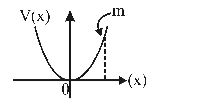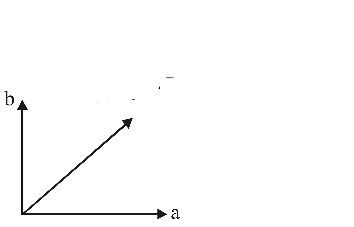Oscillations
- Out of the following functions, representing motion of a particle, which represents SHM?
(A) y = sin ωt - cos ωt
(B) y = sin3 ωt
(C)y = 5 cos 
3π - 3ωt 
4
(D) y = 1 + ωt + ω2 t2
-
View Hint View Answer Discuss in Forum
Only functions given in (A) & (C) represent SHM.
Correct Option: C
Only functions given in (A) & (C) represent SHM.
- A particle of mass m is released from restand follows a parabolic path as shown. Assuming that the displacement of the mass from the origin is small, which graph correctlydepicts the position of the particle as a function of time

-
View Hint View Answer Discuss in Forum
The given velocity-position graph depicts that the motion of the particle is SHM.
In SHM, at t = 0, v = 0 and x = xmax
So, option (a) is correct.Correct Option: A
The given velocity-position graph depicts that the motion of the particle is SHM.
In SHM, at t = 0, v = 0 and x = xmax
So, option (a) is correct.
- A particle of mass m oscillates along x-axis according to equation x = a sin ωt. The nature of the graph between momentum and displacement of the particle is
-
View Hint View Answer Discuss in Forum
As v2 + y2 = 1 This is the equation of ellipse. a2 ω2 a2
Hence the graph is an ellipse. P versus x graph is similar to V versus x graph.
Correct Option: D
As v2 + y2 = 1 This is the equation of ellipse. a2 ω2 a2
Hence the graph is an ellipse. P versus x graph is similar to V versus x graph.
- The oscillation of a body on a smooth horizontal surface is represented by the equation , X = A cos (ωt)
where X = displacement at time t
ω = frequency of oscillation
Which one of the following graphs shows correctly the variation of ‘a’ with ‘t’?
-
View Hint View Answer Discuss in Forum
Displacement, x = A cos (ωt) (given)
Velocity, v = dx = -Aω sin (ωt) dt Acceleration, a = dv = -Aω2 cos ωt dt
Hence graph (c) correctly dipicts the variation of a with t.
Correct Option: C
Displacement, x = A cos (ωt) (given)
Velocity, v = dx = -Aω sin (ωt) dt Acceleration, a = dv = -Aω2 cos ωt dt
Hence graph (c) correctly dipicts the variation of a with t.
- When two displacements represented by y1 = a sin(ωt) and y2 = b cos(ωt) are super-imposed the motion is :
-
View Hint View Answer Discuss in Forum
The two displacements equations are y1 = a sin(ωt)
and y2 = b cos(ωt) = b sin 
ωt + π 
2
yeq = y1 + y2= a sinωt + b cosωt = a sinωt + b sin 
ωt + π 
2
Since the frequencies for both SHMs are same, resultant motion will be SHM.Now Aeq = √a2 + b2 + 2ab cos π 2
⇒ Aeq = √a² + b²
Correct Option: B
The two displacements equations are y1 = a sin(ωt)
and y2 = b cos(ωt) = b sin 
ωt + π 
2
yeq = y1 + y2= a sinωt + b cosωt = a sinωt + b sin 
ωt + π 
2
Since the frequencies for both SHMs are same, resultant motion will be SHM.Now Aeq = √a2 + b2 + 2ab cos π 2
⇒ Aeq = √a² + b²

